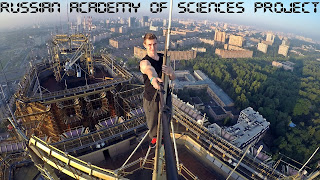 |
| Russian Academy of Sciences |
To date, the vast majority of scientific research in Russia has been conducted within the walls of the Russian Academy of Sciences – more than 80%, according to Vladimir Fortov, the head of the academy – however, the Russian Ministry of Education and Science is planning to change the entire approach for the development of science in Russia.
The ministry has drafted a new federal law that will regulate the development of Russian science and the system of higher education and which should replace the existing federal law on 'Science and State Scientific and Technical Policy'.
The new law will pay more attention to the development of university science and will stimulate the conducting of research and development, or R&D, activities in national universities, as opposed to the Russian Academy of Sciences.
A contributing motive for the switch in emphasis to universities is the high level of bureaucratisation of the academy, whose structure has been criticised by the Russian federal government, and in particular by Livanov and other top officials from the Ministry of Education and Science.
Lyudmila Ogorodova, deputy minister of Russia’s Ministry of Education and Science, said existing legislation in the field of science and higher education, and in particular the basic federal law on 'Science and State Scientific and Technical Policy' is incoherent and reduces the effectiveness of scientific activities in Russia.
She said there is a “high level of bureaucratisation of national science” and that priority to date has been given to the national Russian Academy of Sciences, leaving universities with an “insignificant” share of R&D activities in Russia.
Livanov was the first to advocate the development of university science in Russia in the State Duma in 2014, where he received the backing of MPs.
The focus in the initial stages would be on developing R&D activities in some of the country’s leading universities, including the Moscow State University, Saint Petersburg State University, the Far Eastern Federal University and some others. The Russian government will provide grants to these universities for the acceleration of R&D activities, although the scale of the grants is not expected to be announced until later this year.
The heads of some of Russia’s top universities have voiced support for the change of tack.
Viktor Sadovnichy, head of Moscow State University, said there is an “acute need” for the development in Russia of university science that will fully comply with the current trends in the global system of higher education.
“At Moscow State University, in recent years we have doubled the area of university infrastructure specially designed for conducting research and development activities in different spheres of science,” he said.
“The new law should also help to more actively put our scientific research into practice."
He said the university is planning to more actively transform scientific findings and the developments of scientists into technological developments supporting Russian industrial production. For this purpose, there are plans to establish a special environment in the form of a special technological cluster in Moscow.
In a separate development, as reported in University World News, the government in March approved a large-scale research and technology valley in the centre of Moscow, which will be the largest scientific and technological centre in Russia, incorporating part of Moscow State University and the Russian Academy of Sciences. It will focus on research activities and the commercialisation of scientific developments and, according to state plans, will be like a hybrid of Harvard University and Silicon Valley.
*Meanwhile, writes Brendan O’Malley, Prime Minister Dmitry Medvedev has told his government that the drive to achieve five universities in the top 100 internationally by 2020 is yielding results. At a cabinet meeting on 19 May he told ministers the number of universities included in the overall global rankings has grown, as have ratings on key disciplines. These included ratings in areas of traditional Russian strength such as mathematics and physics but also, in the past two years, in the humanities.
“Many universities have improved their research results and the number of publications – the citation index has doubled since 2012,” he said.
The drive has been supported by the allocation RUB30 billion (US$446 million) in competitive subsidies for universities in 2013-15 – 88 applications were filed and 21 universities became winners – and RUB11 billion this year.
However, the prime minister warned that more must be done to market Russian universities.
“We have world-class universities. But we have little experience in promoting ourselves in the education market. Anglo-Saxon universities, for example, do a far better job. We should learn to promote our strengths,” he said.




0 Comments